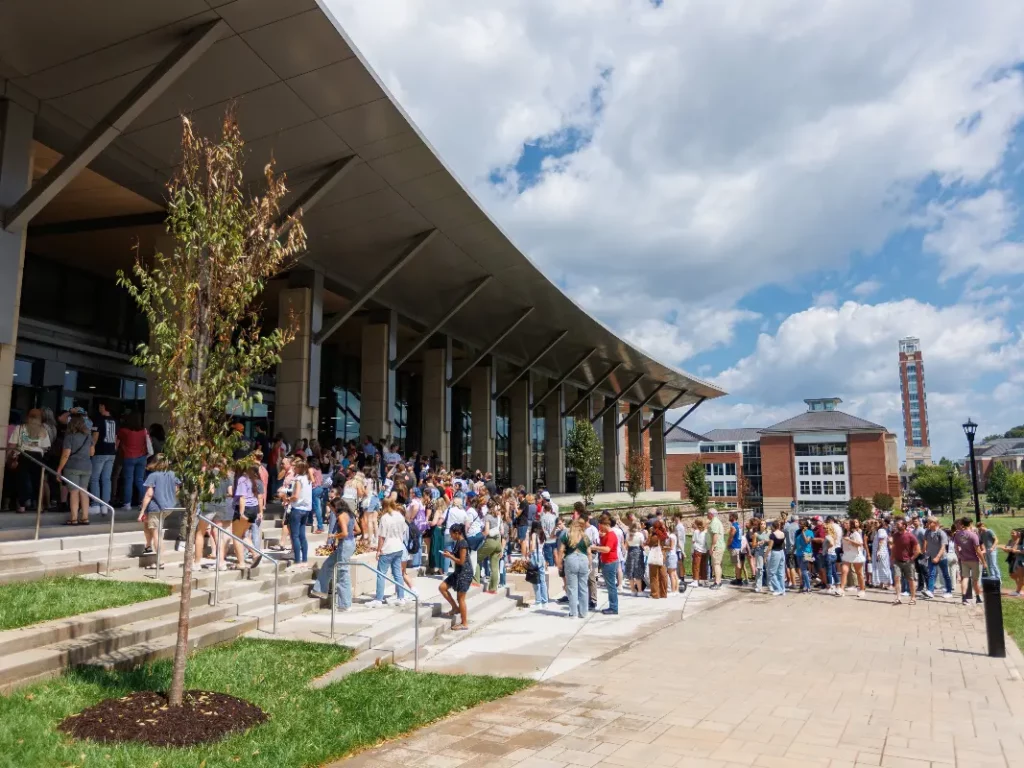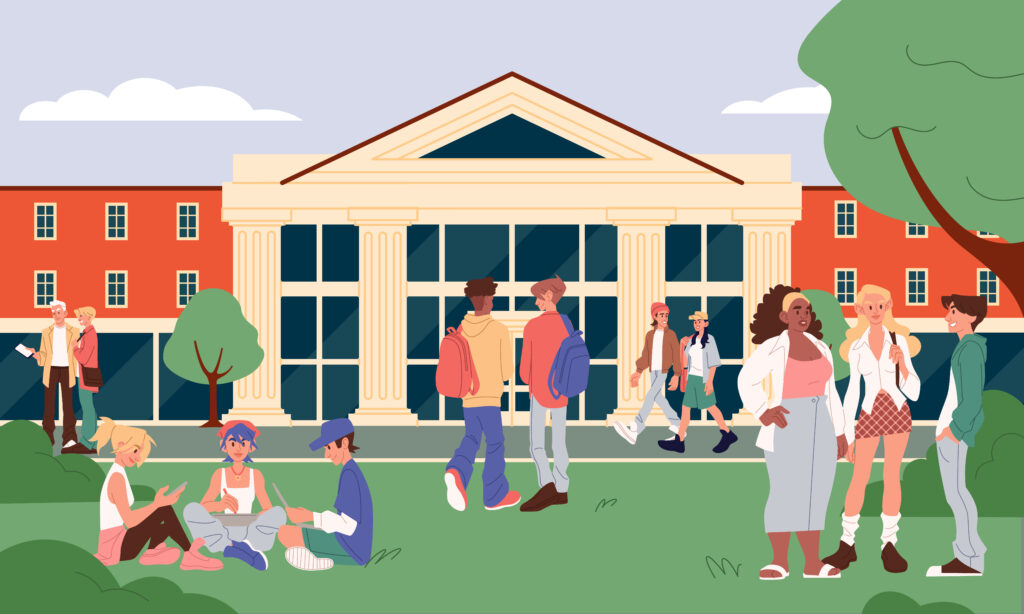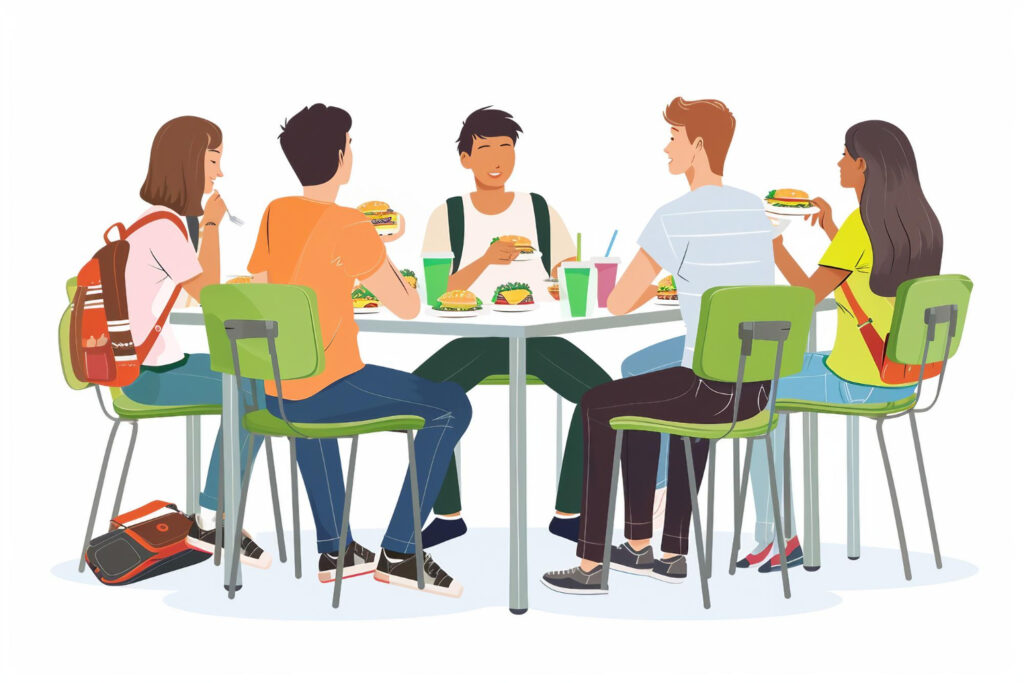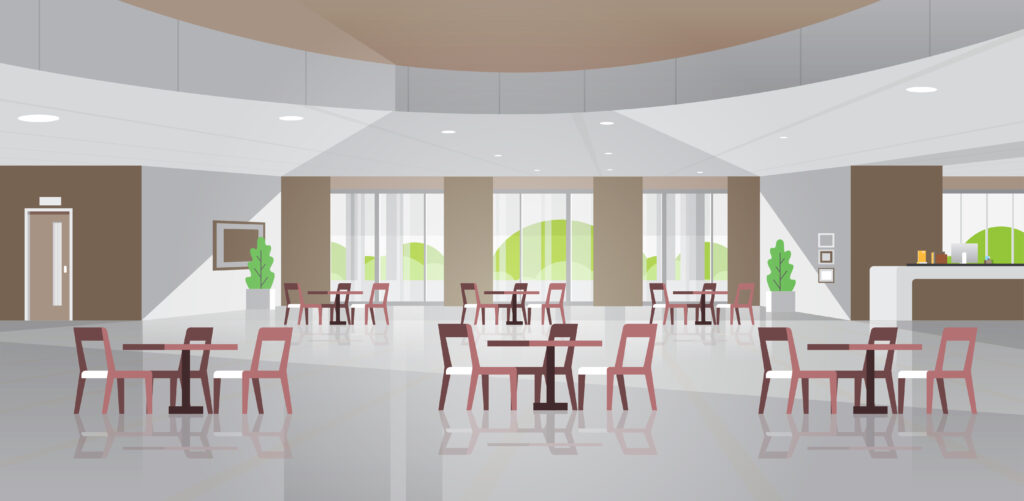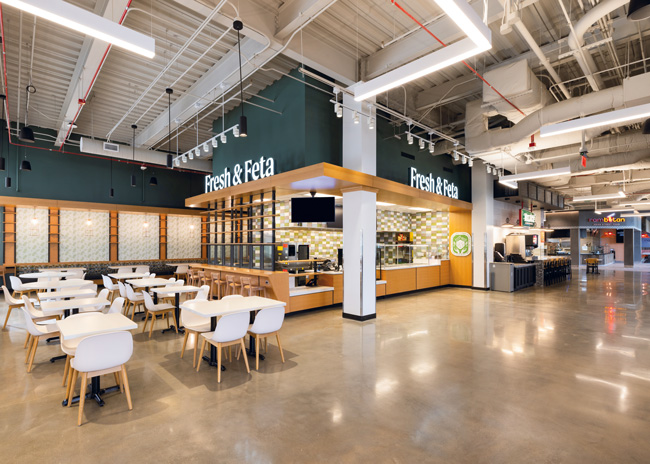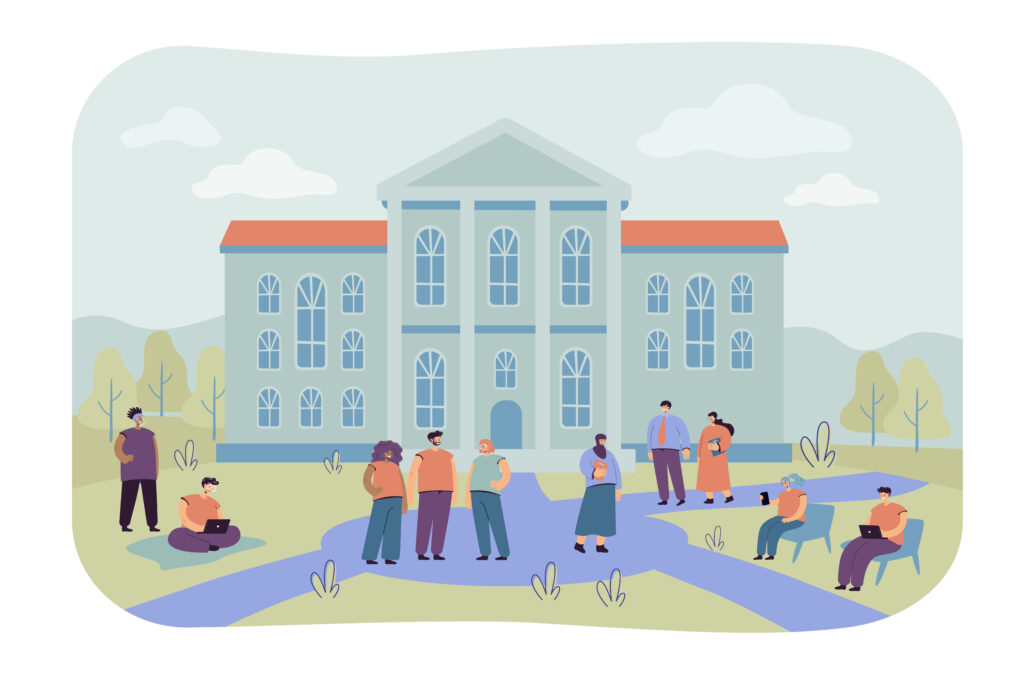
The Social Architect Digest is a thought-provoking, digital blog authored by H. David Porter, a trailblazing visionary with over five decades of experience in strategic planning, campus design, and innovative food service operations. As President and CEO of Porter Khouw Consulting, Inc., David has redefined the college and university dining experience throughout his career pioneering the concept of SOCIAL ARCHITECTURE™. This holistic approach merges design, community-building, social interaction, and strategic foresight to create transformative campus environments.
This weekly blog delivers expert insights and ideas for university administrators, food service professionals, and architects striving to craft Next Generation Residential and Retail Dining Programs. This blog bridges the gap between visionary strategy and real-world application. Drawing exclusively from David’s extensive experience and knowledge of consulting for college and university dining programs since 1990, in addition to 19 years of hands-on operations and management experiences that all began at the iconic Pillar House fine dining restaurant (circa 1971-1979) and including Harvard University in the late 80s.
Tokyo Weekend: Insatiable Curiosity, Fluffy Pancakes, and Ramen Revelations
In Tokyo, even breakfast can become a lesson in leadership. This weekend in Shibuya, a plate of cloud-like soufflé pancakes and a bowl of meticulously crafted ramen revealed something bigger than food. They revealed how ritual shapes behavior, how innovation can honor tradition, and how inclusion can be designed, not added as an afterthought.
From Flipper’s Egg Farm to Table philosophy to Jikasei MENSHO’s seamless blend of craft and technology, Tokyo reminds us that experience always outperforms transaction.
A pancake can teach patience.
A bowl of ramen can teach respect.
Read more as David reflects on what these moments mean for leaders designing environments where people belong.
When “Expert” Dining Advice Quietly Suppresses Retention
What if declining retention has less to do with price and more to do with belonging? When fall-to-fall retention slips into the seventies, a consistent pattern often emerges: dining is operationally efficient, financially stable, and contractually sound, but it is not intentionally designed to foster social integration. And in the first 45 days of a student’s experience, social integration is everything.
Students don’t leave solely because of cost. They leave when the connection never fully forms. Dining is the most repeated social touchpoint on campus. If it is optimized primarily for throughput instead of belonging, the financial consequences can quietly compound into the millions. Efficiency is not a strategy. Belonging is.
Why Recommend All Access Meal Plans When the Program Is Designed to Limit Access to Food?
“All-access” meal plans are often positioned as a student-centered solution that offers flexibility and value. In reality, many dining programs are intentionally designed around limited hours, constrained platforms, and tightly controlled availability. In this blog, David Porter examines why the all-access model continues to be recommended, how it manages institutional cost and risk, and what campus leaders should be asking when marketing language and lived student experience do not align.
Design Without Operational Insight Creates Beautiful Dysfunction
Beautiful dining spaces don’t always work beautifully. Across higher education, award-winning facilities open with high expectations, only to struggle with congestion, staff strain, limited access, and student disengagement. When design is separated from operational insight, even the most impressive spaces become daily obstacles. In this week’s blog, David Porter explores why integration, not aesthetics alone, determines whether dining becomes a place students choose or quietly avoid.
The New Day-to-Day Center of Gravity and Heartbeat of the Campus
A dining commons does far more than feed students. It shapes daily behavior, establishes routine, and plays a central role in fostering belonging and well-being. When thoughtfully designed and carefully stewarded, it becomes a campus’s most powerful day-to-day social engine. At Liberty University, the 3,000-seat Reber-Thomas Dining Commons now serves that role. More than the largest next-generation residential dining facility in North America, it functions as the daily center of gravity for campus life. It is a place where students gather, linger, connect, and return, reinforcing community, continuity, student retention, and persistence through everyday experience.
Why Fall 2026 Will Clearly Separate Institutions That Acted From Those That Waited
By Fall 2026, the separation between institutions that acted and those that hesitated will be undeniable. As campuses focus on demographic and financial pressures outside their control, they often ignore one of the most immediate and fixable levers shaping student engagement and retention: dining. Dining is not a support service. It is a defining part of the student experience, influencing enrollment, satisfaction, student emotional well-being, academic success, and financial performance. Institutions that act now retain leverage. Those who delay surrender it.
“Loneliness Will Kill You Faster Than a Bad Diet”
The phrase is not mine. Physician and author Dr. Mark Hyman has said it plainly: loneliness will kill you faster than a bad diet
It is a powerful statement, and one supported by research showing that chronic loneliness is a serious biological risk factor, not just an emotional concern. What higher education discusses less often is when loneliness most commonly takes hold.
For many students, the earliest weeks of their first year on campus are the most vulnerable.
Seen through this lens, loneliness is not a personal failure. It is a design challenge, one institutions are uniquely positioned to address.
What Many Campuses Could Continue Getting Wrong in 2026
As colleges and universities race toward an AI-enabled future, many are solving efficiency while overlooking the human systems that actually determine student success. In 2026, the most damaging failures will not be technological or financial. They will be cultural, experiential, and strategic, rooted in a failure to understand how belonging is built and lost on a daily basis.
In this post, Porter Khouw Consulting President and CEO David Porter outlines the patterns campuses could continue getting wrong, including scarcity-driven decision-making, the misalignment of dining and retention, and the quiet abdication of leadership to contractors. Drawing on SOCIAL ARCHITECTURE™, abundance thinking and decades of firsthand experience, the blog reframes student success as the cumulative outcome of everyday interactions, not aspirational plans or annual reports.
Invisible Intelligence: Why the Future of Campus Dining and Student Success Depends on AI That Protects Human Connection
Artificial intelligence is moving fast across higher education, but the real question isn’t speed. Its intention. When technology is poorly designed, it erodes trust and replaces human connection with transactional efficiency. When designed well, it functions as invisible infrastructure: quietly removing friction so the community can flourish.
That’s why campus dining matters more than most people realize. It’s one of the only universal, daily experiences on campus, a mission-critical social and emotional environment where belonging is formed, loneliness is reduced, and students feel seen.
If AI is going to reshape the student experience, dining may be the most important place to get it right.
NEXT-GEN COMMUNITY COLLEGE CAMPUS RETAIL STORES
Most community college students don’t have time to linger. They sprint from class to work to home, grabbing whatever food, coffee, or supplies they can along the way. The Next-Gen Community College Retail Store (NGCCRS) prototype is built for that reality, a single, smartly designed space where a student can refill a branded mug, snag a breakfast sandwich, pick up a charger, and spot a hoodie that actually feels like something they’d wear. In the process, everyday transactions quietly turn into moments of campus pride, culture, and belonging.
Meal Plans Aren’t Failing. Institutions Are.
Meal plans aren’t crumbling because they’ve gotten too expensive or because students have suddenly become demanding. They’re crumbling because many institutions still rely on outdated program policies and a scarcity mindset that treats dining as a cost to contain rather than a culture to create. A significant percentage of campuses operate under legacy rules that restrict access and weaken what should be the social heartbeat of all campuses.
David Porter argues that dining is SOCIAL ARCHITECTURE™. When programs become rigid and transactional, students don’t just abandon the plan. They abandon the experience, and institutions pay the price in lower engagement, weaker housing occupancy, and sliding sophomore retention.
The solution is not cosmetic. It’s a mindset. Abundance Thinking shifts the question from “What does it cost?” to “What does it create?” Institutions that make this shift see higher participation, stronger community, and measurable gains in student success.
Planning While Others Pause: How Institutions Win During the Quiet Season
Thanksgiving is in the rear-view mirror, campuses are quiet, and most institutions are easing into the slowest stretch of the academic year. But this quiet season is one of the most important opportunities you will have to improve the experience and outcomes of your incoming Fall 2026 freshman class and strengthen your institution financially.
The decisions you make between now and early spring can increase participation, elevate dining value, and transform the first 45 days on campus, which remains the most critical window for freshman success and long-term retention. Even a one percent increase in fall-to-fall freshman retention can generate millions of dollars in new tuition, room, and board revenue. Dining is one of the fastest and most reliable levers to influence these gains.
This quiet season is not downtime. It is a strategic window to create meaningful student impact and powerful institutional financial momentum.
MATTERING AT THE TABLE: HOW DINING, SPACE, AND SOCIAL ARCHITECTURE™ SHAPE STUDENT BELONGING
College dining isn’t just about serving meals; it’s about shaping the emotional center of campus life. In Mattering at the Table, David Porter explores how dining spaces, daily rituals, and SOCIAL ARCHITECTURE™ influence whether students feel seen, valued, and connected. From the role of global flavors to the limits of centralized dining, this piece uncovers why the dining hall often becomes the strongest engine of belonging on campus.
“It’s Kind of Fun to Do the Impossible.” Walt Disney Said It. At PKC, We Prove It.
David delivers a clear reminder of what sets PKC apart. Most firms talk vaguely about improving dining. PKC is the only one willing to guarantee measurable programmatic and financial results. After more than 400 campus engagements across all fifty states, Canada, and the United Kingdom, David has seen one truth repeat itself. The impossible is never a barrier. It is the starting point.
When outdated food service contracts quietly drain millions and student satisfaction drops, PKC steps in, rebuilds the strategy, expands the program, resets the financials, grows the bottom line, and proves that dining can be transformed without raising student meal plan prices. That is why the guarantee works. The math supports it.
If You Wander Into Shark-Infested Waters and Get Bitten, Is It the Shark’s Fault?
When colleges and universities outsource their dining programs, the results, good or bad, often reflect the systems they’ve built, not the contractors they’ve hired. In his latest blog, David Porter explores why so many institutions feel disappointed after signing “partnership” contracts that seem promising at first, but come with hidden costs and long-term consequences.
Through PKC’s proven approach and SOCIAL ARCHITECTURE™, Porter explains how schools can reclaim control, align incentives, and transform dining into a true catalyst for community, satisfaction, and success.
Love: The Invisible Ingredient That Turns a Meal Into a Moment
In David’s latest blog, “Love: The Invisible Ingredient That Turns a Meal Into a Moment,” Porter Khouw Consulting explores how SOCIAL ARCHITECTURE™, our approach to designing for connection, can turn dining from a transaction into a transformation.
When love is built into dining spaces through thoughtful design, caring service, flexible schedules, and shared storytelling, mealtime becomes something more: a moment of belonging, a spark of friendship, and a reason to stay.
Discover how love, the most overlooked ingredient in campus dining, can change everything.
Predictable Abundance: The Secret Ingredient of Next-Generation Campus Dining
Students don’t crave chaos; they crave confidence. Across hundreds of campuses, our data shows that when dining programs deliver consistent, dependable experiences, participation and satisfaction soar. “Predictable Abundance” is more than a catchy phrase; it’s a strategy that transforms dining from a cost center into a community engine. Learn how reliability, emotional connection, and operational discipline can turn food service into your strongest retention tool.
Campus Housing Combined with a Mediocre Dining Program: A Hollow Promise of Residential Life
Colleges love to talk about creating “vibrant residential communities.” But as David Porter explores in his latest blog, Campus Housing Combined with a Mediocre Dining Program: A Hollow Promise of Residential Life, beautiful buildings alone can’t create belonging. Across 400+ campuses, Porter Khouw Consulting has seen the same truth: housing and dining aren’t separate silos; they’re two halves of one social ecosystem. When dining thrives, community flourishes. When it doesn’t, connection and retention crumble.
Data Without Lived Experience Is a Sterile Echo of Reality
In his latest piece, Data Without Lived Experience Is a Sterile Echo of Reality, David Porter challenges higher education’s obsession with being “data-driven.” He argues that while dashboards and KPIs may quantify performance, they often miss the human truths that define student life. “Data tells you what happened, not why,” he writes. Porter calls for a new standard, one that merges analytics with empathy. Through the lens of SOCIAL ARCHITECTURE™, he illustrates how campuses can transform dining from a transactional service into a catalyst for connection, belonging, and retention. Because, as he concludes, “you can’t spreadsheet your way to belonging.”
The Strength of Weak Ties: College Dining and the Small World Effect
In The Strength of Weak Ties, David Porter reminds us that dining isn’t just about food; it’s about belonging. Drawing on sociologist Mark Granovetter’s insights, he demonstrates how casual connections, those fleeting “Hey, is this seat taken?” moments, can make all the difference in whether a student feels at home on campus. As the blog explains, dining halls are more than meal service centers; they are “belonging engines,” places where students build weak ties that create resilience, reduce isolation, and fuel persistence. Whether through late-night fries with a new acquaintance or the quiet reassurance of “alone connectedness,” dining becomes the stage where an abundance of belonging takes root.
Abundance Thinking, Customizable Craveables, Every Single Day
Campus dining often falls into the trap of the Variety Paradox, believing that more menu items equal more satisfaction. In reality, endless SKUs overwhelm operations, slow service, and still leave students walking away disappointed. Abundance Thinking offers a better way. By focusing on a dependable core of customizable craveables, burgers, wings, tenders, nachos, bowls, milkshakes, students experience the perception of endless variety without the operational chaos. The result is dining that feels reliable, personal, and social. Abundance isn’t about offering everything; it’s about offering the right things consistently, creating SOCIAL ARCHITECTURE™ that fuels connection, belonging, and retention.
Pancakes for Lunch, Abundance Thinking in Campus Dining
There’s something quietly powerful about the idea of serving pancakes at noon. At first glance, it feels playful, but it represents something bigger: abundance thinking. On today’s campuses, students expect flexibility, choice, and care that matches the world they live in. When dining says “no,” they look elsewhere. When dining says “yes”, yes to pancakes for lunch, yes to late-night burgers, yes to weekend brunch, it signals belonging, connection, and support. In our latest blog, we explore how shifting from scarcity to abundance in campus dining can directly influence student engagement, retention, and long-term success.
The Sustainable Abundance of Anytime Dining
In today’s higher education landscape, students are no longer satisfied with dining models rooted in scarcity, limited hours, repetitive menus, and capped meal plans that create stress and push them off campus. Instead, they crave flexibility, variety, and a sense of belonging. The Sustainable Abundance of Anytime Dining reframes dining as more than food; it’s a holistic experience of food, friends, fun, and hospitality, all fully included in an all-access meal plan tied to housing. This model delivers not just nourishment, but emotional security, community, and convenience, ensuring students feel welcome and supported at any time of day.
The Great Bait-and-Switch: The Freshman Meal Plan Paradox
The Freshman Meal Plan Paradox starts with love expressed in dollars. Parents tour gleaming dining halls, see an abundance everywhere, and purchase the all-access plan as a guarantee of care, safety, food security, and a sense of belonging for their child. However, once the semester begins, the promise of residential “Anytime Dining” often unravels into limited hours, empty stations, and a program that quietly funnels students into retail outlets, utilizing equivalencies and declining balance meal plan dollars. What was meant to be abundance becomes scarcity, leaving freshmen frustrated, hungry, and questioning the value of the very institution that sold them the dream.
The Great Dining Hall Illusion: Primed by Pop Culture, Wired by Maslow
For decades, movies, television, and animation have made cafeterias and dining halls the epicenter of social life. Adolescents absorb those stories at a formative stage, and by the time they reach college, the expectation is hardwired.
The dining hall is never just about eating; it’s about visibility, acceptance, and identity. The message is consistent across decades: the cafeteria or dining hall is where SOCIAL ARCHITECTURE™ is built.
So, when freshmen enter a dining hall for the first time, they aren’t looking at just the food stations. They’re looking for belonging. They are looking to make and nurture new lifelong friendships.
My Crystal Ball Is Broken: The Future of Campus Dining Demands Strategy, Not Guesswork.
Real strategic planning is not about predicting the future; it’s about preparing for it. Dining is not peripheral; it’s central to retention, housing occupancy, student well-being, and long-term financial health. Students today expect authenticity, flexibility, and spaces that foster connection. Institutions that cling to outdated contracts or dining models risk declining retention, empty beds, and financial stagnation. The cost of inaction dwarfs the cost of planning.
When done right, strategic planning transforms dining into a hub of SOCIAL ARCHITECTURE™, strengthens the bottom line, and creates the kind of community that keeps students enrolled. The future doesn’t reward guesswork; it rewards courage, clarity, and action.
Happy Accidents: The Serendipity of SOCIAL ARCHITECTURE™
Some of the most meaningful college connections start as “happy accidents,” a chance conversation in the dining hall, a shared laugh in line, an unexpected study partner. SOCIAL ARCHITECTURE™ turns those moments from rare occurrences into everyday experiences by shaping dining spaces that spark connection. From communal tables to strategic flow, these design choices boost retention, increase meal plan participation, and strengthen a student’s sense of belonging. In an era where loneliness is rising, engineering serendipity isn’t just good design; it’s a vital part of student success.
Is the “Opposite of Loneliness” Achievable with SOCIAL ARCHITECTURE™?
In his latest blog, “Is the ‘Opposite of Loneliness’ Achievable with SOCIAL ARCHITECTURE™?”, David Porter explores how campuses can combat student isolation through intentional dining design. Inspired by Marina Keegan’s powerful essay, this article challenges higher ed leaders to think beyond food and facilities and toward fostering human connection.
Porter argues that dining spaces, when approached as emotional and social engines rather than transactional services, can be pivotal in shaping a student’s sense of belonging. With strategies rooted in SOCIAL ARCHITECTURE™, he outlines how campuses can create spaces that feel less like cafeterias and more like community hubs, town squares where relationships are built, ideas are exchanged, and loneliness is quietly replaced with connection.
Because at the end of the day, it’s not just about feeding students. It’s about making sure they feel like they belong.
The Insidious Incentive for Operators to Promote Meal Equivalency Usage
What began as a simple convenience, letting students use a meal swipe at retail instead of the dining hall, has become a system of insidious incentives. In this blog, David Porter breaks down how widespread reliance on meal equivalency programs often benefits food service operators at the expense of students, parents, and the campus community.
Learn how restricted combos, dollar caps, and hidden financial rewards for operators are hollowing out the residential dining experience and what your institution can do to fix it.
Your $30M Dining Investment Pays for Itself in 3–5 Years, While Your $300M Housing Project Is Still Decades Away from Breaking Even
Colleges keep building more housing to increase retention, persistence, and enrollment, but what if that’s not addressing the core problem? A $30M investment in NextGen Anytime Dining crafted through the lens of SOCIAL ARCHITECTURE™ transforms the student experience, fosters belonging, and drives retention, persistence, and enrollment, all for just 10% of the cost of new housing. And while a residence hall takes decades to pay off, your dining hall can pay for itself in just 3–5 years. Because students don’t transfer out due to outdated housing, they transfer to other schools when they don’t feel like they belong.
No Fries, No Thanks: The Ultimate Craveable Side Order That Drives Student Satisfaction, Return Traffic, and Meal Plan Value
Think fries are just a side? Think again. On college campuses, crispy, golden French fries aren’t just a crowd favorite; they’re a strategic asset. From boosting return traffic and meal plan value to creating emotional consistency in a chaotic student schedule, fries quietly drive satisfaction like few other menu items can. This blog explores why great fries aren’t optional; they’re essential. And if you’re not leveraging them daily, you’re missing out on one of the most powerful tools in campus dining.
Don’t Be Fooled…
Colleges are pouring millions into sleek, modern dining halls, but many are still operating with a 1970s program mindset. At Porter Khouw Consulting, we’ve seen it time and again: outdated dining models quietly sabotage even the most impressive facilities. A beautiful space means nothing if the food program is inflexible, inconsistent, or not dialed into the needs of today’s college students. That’s why we pioneered and continue to champion SOCIAL ARCHITECTURE™, a student-centered model that turns dining into the emotional and social heartbeat of campus life, driving connection, real community, and lifelong friendships.
The Evolution of Retail Design: Lessons from Perry Place at Virginia Tech
At Virginia Tech’s Perry Place, retail design becomes more than aesthetics; it becomes storytelling, transparency, and a reflection of student identity. In this piece, David Porter distills decades of experience into a powerful case study that reveals how immersive, student-informed design transforms dining from a transactional necessity into a destination. From all-day breakfast diners born from student requests, to visible smokers and wok ranges that double as theater, Perry Place exemplifies the shift toward emotionally resonant, operationally agile spaces that foster community. The lesson is clear: design with your audience, not for them.
“Gen Z Won’t Tolerate Being ‘Othered’ by Your Menu”
Gen Z won’t settle for just menu choices, they want to be seen, heard, and valued. From cultural representation to sustainability and ingredient transparency, today’s students are demanding more than food, they’re demanding belonging.
In this compelling new blog, David Porter, drawing on the expertise of Sid Mehta, reveals how subtle forms of “othering” in campus dining programs are eroding trust, engagement, and retention. And why, in an era where identity and inclusion matter more than ever, ignoring these signals could cost your institution far more than a few meal swipes.
Discover how SOCIAL ARCHITECTURE™ can help transform dining from a transactional experience into a powerful engine of community, empathy, and emotional well-being.
Don’t just serve Gen Z. Invite them to the table and let them shape it.
What You Really Learn at MIT and Why Next-Gen Dining Matters More Than Ever
In this week’s blog, David dives into a powerful truth echoed by Peter Diamandis: the real ROI of college isn’t just what you learn, it’s who you meet, how you think, and the community you build. Drawing from decades of experience in higher ed strategy, David unpacks the idea that dining spaces, when designed through the lens of SOCIAL ARCHITECTURE™, can be some of the most transformative places on campus. It’s not just about meals; it’s about moments that spark lifelong connections. Don’t miss this look at how campuses can unlock the hidden curriculum through intentional social design.
The Meal Plan Revolution: Why Students Aren’t the Problem—Your Program Is.
Why are students ditching meal plans in droves, even after parents invest in the biggest options? The answer might not be what you think. Drawing from over five decades of food service experience, including Harvard dining operations and more than 400 campus consulting projects, David Porter reveals the truth behind declining participation: it’s not about the price, it’s about the program.
In this blog, discover how “The Inferior Program Penalty” and outdated assumptions are crippling campus dining—and how rethinking your approach through value-driven, student-centered design can turn your meal plan from a burden into a magnet. Learn why students will pay more when a program works for them. and how SOCIAL ARCHITECTURE™ is the key to transformation.
A Bowl of Tomato Soup & a Grilled Cheese Sandwich – Drop the Mic
What if the key to student success isn’t in the classroom, but in the dining hall?
In A Bowl of Tomato Soup & a Grilled Cheese Sandwich – Drop the Mic, David Porter makes a compelling case for reimagining campus dining as the emotional and social heart of college life. Through the humble lens of comfort food—tomato soup and grilled cheese—Porter explores how simple, nostalgic meals can foster connection, ease loneliness, and become powerful tools for student retention and well-being. This isn’t just about food—it’s about creating spaces that invite students to stay, share, and belong. Hungry for a better campus experience? Start with soup.
Is That Too Much to Ask? Why Every College Dining Hall Should Offer French Fries, Mac ‘n Cheese, Great Burgers, Grilled Subs, Plant-Forward Options and Allergen-Free Choices—Every Single Day
Is it too much to ask for consistent, craveable, inclusive food options every single day, especially when I’m paying between $5,000 and $9,000 a year for a mandatory meal plan?
In his latest blog, David challenges colleges to rethink what students really want from their dining experience. Spoiler alert: it’s not complicated, it’s consistent, craveable, inclusive food that shows up daily and delivers on the value of a dining program that is worth paying $5K+ for a mandatory meal plan. It’s time to stop making excuses and start forming social ecosystems and friendship networks.
Milkshake for Breakfast: Why It’s Time to Rethink the Rules of Dining on Campus
There’s something delightfully rebellious—almost poetic—about the idea of having a milkshake for breakfast—a small act that flips outdated campus dining norms on their head. In “Milkshake for Breakfast,” David Porter, FCSI, challenges institutions to reimagine the dining experience as a vital tool for student well-being, not just a schedule-driven service. He argues that giving students the freedom to choose—from tofu scrambles to protein-packed shakes—creates more than just meal variety; it fosters community, independence, and a sense of belonging. With his SOCIAL ARCHITECTURE™ approach, Porter makes a compelling case: the path to student connection might just begin with breakfast—and a milkshake.
How to Eliminate “The Inferior Program Penalty” and Restore the Full Value and Appeal of Your Dining Program and Meal Plans for Your Students
When students are forced to buy a meal plan they don’t value, they pay twice—once to the school, then again to DoorDash. We call this The Inferior Program Penalty, and it’s costing colleges more than just revenue—it’s hurting satisfaction, retention, and campus life. David explains how PKC helps schools eliminate this penalty by designing dining programs that offer real value: convenience, variety, flexibility, and relevance. Is your campus paying the price? Let’s fix that.
The Freshman Fallacy: The Myth That’s Undermining Campus Dining
The claim that residential dining becomes monotonous after a few weeks is a myth—one often used to justify cutting menus, shrinking hours, and shifting students to retail outlets. But students aren’t tired of dining halls; they’re tired of uninspired design. When dining is built around connection, care, and community—not just convenience—it becomes the heartbeat of campus life, not a burden to escape.
The Ultimate Outcome of a College Education: Can Next-Gen Residential & Retail Campus Dining Foster Human Connections, Belonging and Lifelong Success?
Think campus dining is just about food? Think again. In David’s latest blog, he reveals how dining programs, when intentionally designed, can become one of the most powerful tools in higher education. Rooted in the concept of SOCIAL ARCHITECTURE™, this piece explores how shared meals foster belief, belonging, and the deep connections that drive student retention, well-being, and even career success.
Food, Feelings, and Futures: The Power of Comfort Food in Campus Dining
What if one of the biggest secrets to student happiness—and retention is staring us in the face? In this joyful and data-backed blog, David Porter shares why good comfort food is more than a necessity, it’s a strategic pillar and cornerstone of the student experience. From mac & cheese, fresh baked rolls w butter, roasted potatoes, chicken tenders, mozzarella sticks and Belgium waffles topped with vanilla ice cream, Porter explains how craveable comfort food and well-designed dining spaces foster and amplify emotional connections, boost mental health and emotional security, and turns the freshman fifteen into making fifteen new friends not gaining fifteen new pounds. This isn’t just about flavor—it’s about feelings, memories, and human connections. And human connection(s) create positive results.
From Isolation to Integration: Reimagining the Campus for Human Connection
Today’s students are more disconnected than ever—and it’s not just a side effect of the pandemic. It’s a generational shift. In this timely and thought-provoking blog, David Porter explores how intentional campus design—what we call SOCIAL ARCHITECTURE™—can rebuild the sense of belonging students desperately need.
From reimagined dining spaces to smarter programming for first-year students, discover how colleges and universities can create environments that foster real human connection, improve retention, and spark lifelong memories.
Flourishing in the Face of Chaos: How Strategic Dining Investments Can Drive Student Success During Economic Uncertainty
In a time of frozen funding, hiring freezes, and escalating student expectations, colleges and universities are under immense pressure to do more with less. But amidst the chaos, a surprising hero emerges: your campus dining program. David breaks down how strategic investments in dining—not cuts—can drive retention, boost auxiliary revenue, and create the kind of community today’s students crave. Discover how campuses are turning food service into a competitive advantage and why connection, not just calories, could be the key to thriving in uncertain times.
Rethinking the RFP- Why it’s Time for Colleges to Take Back Control of Their Dining Programs
In his session at NACAS South 2025, David Porter challenged higher education leaders to rethink food service RFPs. He argued that universities should define their dining programs, not contractors, whose goals prioritize profit over student engagement. Highlighting Porter Khouw Consulting’s approach, he emphasized creating value through student-focused dining experiences and a transparent, fair RFP process. Check out this blog, where he expands on the session’s key insights which urged institutions to take control of their food service strategy and transform student life through dining.
Why is it That the Harder I Work, the Luckier I Get?
What if “luck” isn’t luck at all—but the natural result of relentless effort, bold vision, and deep human connection? In this powerful reflection, H. David Porter shares how decades of strategic work in campus dining have reshaped student experiences nationwide. From the birth of SOCIAL ARCHITECTURE™ – NEXT GEN ANYTIME DINING to a mission that’s transforming lives, this piece is a blueprint for building your own “luck”—one purposeful step at a time.
SOCIAL ARCHITECTURE™ and the Student Social Biome: How Next-Gen Dining and Intentional Campus Design Fuel Connection, Belonging, and Success
Student success isn’t just about academics—it’s about connection. A thriving Student Social Biome is built through daily interactions in residence halls, dining spaces, and common areas. Enter SOCIAL ARCHITECTURE™—a strategic approach to designing campuses that foster meaningful relationships. When paired with Next-Gen Dining, which transforms meals into social experiences, this approach strengthens student well-being, retention, and success. From communal tables to late-night breakfast socials, intentional design fuels belonging. The question isn’t whether your campus has a Social Biome—it’s whether you’re cultivating it for student success.
Creating a Culture of Connection: How SOCIAL ARCHITECTURE™ & Next Gen Dining Build Holistic Student Well-Being
College dining should be more than just meals—it should be a hub for connection and belonging. At Porter Khouw Consulting, our SOCIAL ARCHITECTURE™ approach transforms dining into a powerful tool for student well-being, fostering friendships, resilience, and engagement.The First 45 Days are critical for student retention. Our Next Gen Dining Programs create intentional experiences—small-group meals, cultural storytelling, and community events—that help students find their place.
When dining is designed with purpose, it drives success. Let’s reimagine campus dining together.
Telling Your Own Story: The Strategic Power of Social Architecture™ in Dining Programs
If you don’t tell your story, someone else will—and they won’t get it right. Campus dining programs offer immense value, yet too often, their impact goes unnoticed. Through SOCIAL ARCHITECTURE™, dining can become more than just a meal—it can be a platform for connection, culture, and student success. From engaging staff as storytellers to leveraging student voices and showcasing the real value of meal plans, strategic storytelling is essential. By crafting authentic narratives, dining programs can increase engagement, drive participation, and reshape perceptions.Want to turn your dining program into a story worth telling? Read more to learn how.
Dr. Parnell’s Keynote: “The Joy and Challenge of Student Affairs”: How Next Gen Dining and SOCIAL ARCHITECTURE™ Are Critical to the Future of Higher Ed
If you were at NASPA 2025’s Opening Keynote, you felt it: the tension, the urgency, the hope—and most importantly, the community. Whether you were nodding along with Dr. Amelia Parnell’s deeply personal reflections or digesting the clear-eyed analysis of the state of our profession, one message rang clear: we are in the midst of profound […]
Rate My Freshman Experience: The Porter Index—How to Choose a College and Get the Life You Want
Selecting a college goes beyond academics and rankings—it’s about finding a community where you can thrive. RateMyFreshmanExperience.com offers real student insights into campus life, social dynamics, and support systems, helping prospective students make informed decisions. Through authentic reviews and comprehensive overviews, this platform empowers students to choose a college that aligns with their personal and social needs
The Power of SOCIAL ARCHITECTURE™: A Blueprint for Student Affairs, Anxiety to Empathy—Transforming Campus Dining into a Catalyst for Student Success
With more students commuting, seeking off-campus dining options, or feeling disconnected from their institutions, colleges and universities must reimagine how they structure the student experience. The first six weeks of a student’s college journey are critical—if they don’t form strong connections, they are far more likely to leave. Dining, as the most frequented campus space, offers the greatest opportunity to foster engagement and retention.
Can Next Gen Dining & SOCIAL ARCHITECTURE™ Reduce Anxiety and Help Restore Mental Health in College Students?
Nicholas Kristof has argued that if we want to address the mental health crisis among college students, we need to go beyond band-aid solutions. We need to reimagine the college experience as one centered around human connection.¹ This means designing campuses that prioritize communal spaces, investing in dining programs that bring students together, and recognizing that the most important education students receive may not be in the lecture halls, but in the moments they share with one another over meals, coffee, and conversation.
Can Next-Gen Dining Save Higher Ed? A Holistic Approach to Mental Health and Retention
Higher education faces declining enrollment and rising mental health challenges. The key to retention may be hiding in plain sight—dining. Dining is one of the few universal student touchpoints. When designed intentionally, it fosters social connections, emotional well-being, and academic success. Research shows that friendships formed in the first six weeks of college predict long-term retention. Next-gen dining reimagines meal programs as hubs for interaction, transforming them from transactional spaces into community anchors. By investing in dining as a social infrastructure, colleges can boost retention, engagement, and student success—one meal at a time.
Can My Self-Operated Dining Program Enjoy the Purchasing Power, Volume Discounts, and Rebates of a Global Food Service Organization?
Many colleges assume self-operated dining means sacrificing the bulk discounts, rebates, and cost efficiencies enjoyed by large food service providers. But is that really the case? In our latest blog, we break down how self-op programs can leverage Group Purchasing Organizations (GPOs), direct supplier negotiations, and strategic procurement models to close the pricing gap—without giving up operational control.
The Porter 10X Self-Op Pledge: Transforming Campus Dining with Strategy and Success
Should your campus self-operate its dining program or contract with a food service provider? While self-op offers flexibility and control, it demands strong leadership, financial planning, and operational discipline. At Porter Khouw Consulting, we’ve developed The Porter 10X Self-Op Promises—a framework ensuring self-op dining thrives, not just survives. In this blog, we outline the essential commitments every self-op institution must make for success.
Can Menu Engineering and Prime Cost Optimization Eliminate Subsidized Campus Dining?
Many colleges and universities struggle to keep retail à la carte food service locations financially sustainable. With high food costs, excessive labor expenses, and price-sensitive students, many institutions are forced to subsidize their dining operations, sometimes by hundreds of thousands of dollars annually. Two critical tools—Menu Engineering and Prime Cost Optimization—offer a way to eliminate […]
The Hidden Cost Spiral: Food and Labor Expenses in Management Fee Contracts
This blog uncovers the hidden pitfalls of management fee contracts in campus dining and why they often lead to skyrocketing food costs. It reveals how providers, with no financial risk, lack the incentive to control spending
—leading to inefficiencies, inflated pricing, and excessive waste. More importantly, it explores strategic contract shifts that can hold providers accountable, ensuring cost efficiency and financial sustainability for institutions.
The Variety Paradox: Why Predictable Menus in College Dining Halls Lead to Greater Satisfaction
This paradox challenges traditional dining hall strategies and highlights the value of stability in food offerings. Instead of overwhelming students with choices, a dependable menu that includes the most popular and familiar items creates a sense of reliability and comfort. This article explores the Variety Paradox and its implications for designing dining programs that truly satisfy student needs.
Recruit and Retain More Students and Alumni, Save Millions on Dining, and Stop Letting the Food Service Contractors Eat Your Lunch
If your institution is facing declining enrollment, low student satisfaction with meal plans, and rising costs from food service contractors, it’s time to rethink your approach. The good news? By adopting a strategic, student-focused dining program rooted in SOCIAL ARCHITECTURE™, you can recruit and retain more students, build long-lasting alumni connections, and achieve significant financial savings.
Designing the Heart of Campus Life: A Strategic Food Hall Blueprint
A great campus food hall is more than just a place to eat—it’s a hub for connection and well-being. At PKC Design Studio, our blueprint balances operational efficiency with an exceptional dining experience. By combining data-driven design, smart space planning, and SOCIAL ARCHITECTURE™, we create vibrant, future-ready spaces that foster student engagement and success. Stay tuned to discover how strategic food hall design transforms campus life.
The Enrollment Cliff and Retention Crisis: A Dual Challenge for Higher Ed
With the enrollment cliff and retention crisis looming, colleges face a key question: focus on recruiting new students or retaining current ones? The answer lies in balance. A holistic approach—combining recruitment with student success efforts—is essential. Retention initiatives like first-year support and affordability not only keep students enrolled but also enhance an institution’s appeal. Stay tuned as we explore strategies to future-proof campuses.
Is The Era of Traditional All-You-Care-To-Eat Dining Over?
This blog explores the shift from the traditional “all-you-care-to-eat” dining model to the more flexible and student-centered “Anytime Dining.” As campus dining evolves, this new approach prioritizes convenience, sustainability, and community, addressing concerns like food waste and meal plan dissatisfaction while fostering stronger social connections and improving student retention.
Unlocking the Power of Next-Generation Dining Programs: A Strategic Blueprint for Retention and Housing Success
When colleges and universities grapple with retention issues and declining housing occupancy, the immediate response is often to address financial aid, academic challenges, or mental health services. But there’s a silent, systemic issue hiding in plain sight that can have an equally devastating impact on retention and housing success: the campus dining program.
Self-Operated vs. Contracted Food Services: The Wrong Question?
This blog explores why reframing the conversation and focusing on strategy first, colleges and universities can transform their dining programs from transactional services into transformative tools for campus success.
The Hidden Cost of the Race to the Bottom in Campus Dining: A Case for Value-Driven Strategies
This blog explores why lowering meal plan prices is a short-sighted approach and how institutions can adopt a value-driven strategy that transforms dining programs into powerful tools for student engagement, retention, and success.





